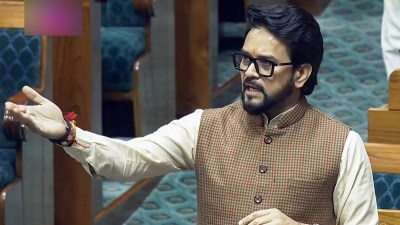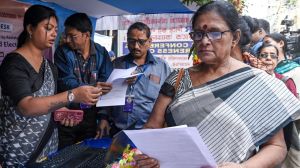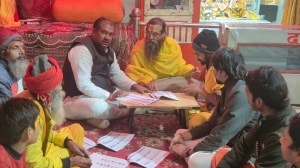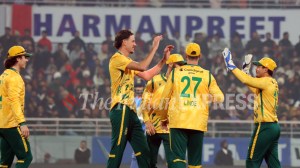The personal and the political: From Nepal, reading Prachanda’s visit to India
Hours before the PM took off from Kathmandu, President Ram Chandra Poudel gave his assent to a controversial amendment to Nepal's citizenship law that grants almost instant citizenship — along with guaranteed political rights — to women foreigners married to Nepalis.
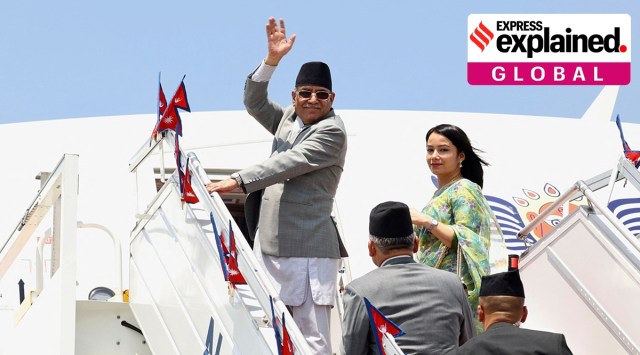 PM Dahal leaves Kathmandu for India on Wednesday. (Image source: PMO Nepal via Reuters)
PM Dahal leaves Kathmandu for India on Wednesday. (Image source: PMO Nepal via Reuters) Prime Minister Pushpa Kamal Dahal ‘Prachanda’ of Nepal arrived in New Delhi for a four-day visit on Wednesday. Dahal, who took office in December 2022, will meet Prime Minister Narendra Modi on Thursday for talks that will focus on cooperation in energy, trade, and connectivity.
Hours before the PM took off from Kathmandu, President Ram Chandra Poudel gave his assent to a controversial amendment to Nepal’s citizenship law that grants almost instant citizenship — along with guaranteed political rights — to women foreigners married to Nepalis.
The amendment, to which former President Bidya Devi Bhandari had declined to assent even after Parliament sent it back to her a second time, makes Nepal’s citizenship law among the world’s most liberal. The action by President Poudel is likely to upset China, which has been warning that the law may give descendants of Tibetan refugees citizenship and property rights.
Prachanda and India
Regular reciprocal visits by heads of state/government had been a bilateral tradition until 1997, after which India continued to host Nepali leaders, but not making reciprocal visits.
While India’s role in mobilising external support, mainly from the European Union and United States, in favour of the establishment of the secular republic in 2006 was widely appreciated, its attempts at “micro management” in Nepal, as Dahal said once, resulted in a significant loss of goodwill. Also, the increased western role in Nepal saw China take aggressive counter-steps to increase its presence and influence in the country.
Prachanda was earlier perceived as being pro-China, with a view of the US and India as “imperialistic and hegemonic forces”. However, the Prime Minister is now widely expected to assure India that he is amenable to aligning with it to contain the influence of China. He has been keen on the visit, and has said he wants to do something significant in the bilateral relationship.
Last February, Dahal had made political U-turn by joining hands with the Nepali Congress to have the $500 million US grant under the Millennium Challenge Corporation Nepal Compact ratified by Parliament, abandoning his party’s view that it was part of the “Indo-Pacific security plan” that would undermine Nepal’s diplomatic non-alignment.
The approval of the citizenship law by President Poudel on Wednesday is seen as another outreach to India and the US. However, the President’s approval is likely to be challenged in court, and could lead to sharp divisions in the political spectrum.
Dahal wants to be seen as a friend to India rather than the revolutionary from 15 years ago who — after becoming Prime Minister for the first time in 2008 — broke the tradition of top Nepali leaders choosing India for their first visit abroad by heading to Beijing instead.
He also appears keen to be seen as respecting the sentiments of Nepali Hindus by including Indore and Ujjain — cities with important Shiva temples — in his itinerary.
There has been progress on resolving the points of friction around hydropower projects that India is executing in Nepal. And the Prime Minister, like his ally and predecessor Sher Bahadur Deuba, has gone slow on projects under China’s Belt and Road Initiative (BRI) that Nepal agreed to six years ago.
Troubles at home
Dahal is aware of the continuing role that India’s goodwill plays in Nepali politics. Last December, he made an attempt, apparently after being nudged by China, to align with another communist party, the Communist Party of Nepal (Unified Marxist-Leninist), but ultimately found the alliance with the pro-India Nepali Congress more comfortable. Chances of the communist parties coming together have now dissipated, at least for now.
Apart for the political instability and a looming economic crisis in his country, Dahal is also concerned about possible Indian backing for royalists who want Nepal’s Hindu kingdom restored. In an opinion poll conducted recently by the leading social research group Interdisciplinary Analysts (IDA), 91% of respondents said the army was the most trustworthy institution. The deposed King Gyanendra Shah has been touring the country, questioning the abilities of political leaders, and Prachanda himself has noted that people’s anger against the current system is on the rise.
The Maoists have been avoiding the truth and reconciliation process for the victims of Nepal’s decade-long insurgency in which 17,000 people were killed, as well as submitting their top leaders to investigation for human rights violations.
As the PM’s political rivals and some human right groups press for the Maoists to be tried at the court in The Hague, Dahal knows that India could help him and his comrades, and even persuade Western countries. He also wants a general amnesty for the perpetrators of human rights violations, and India’s support is very important for him.
Prachanda has a unique ability to be revolutionary in words, and make compromises in practice. His visit to India carries high personal stakes, and he will look for reassurance from Prime Minister Modi.
- 01
- 02
- 03
- 04
- 05


